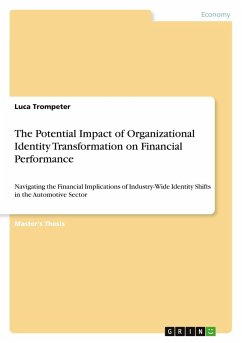
Impact and effects of innovations in the financial industry in Germany
An empirical analysis

PAYBACK Punkte
0 °P sammeln!
Master's Thesis from the year 2021 in the subject Business economics - Investment and Finance, grade: 1,0, University of Warwick (Warwick Manufacturing Group), language: English, abstract: The internet and digitalization tremendously affected many economic sectors, and both take increasingly influence over the financial services industry in Germany. New founded start-up companies, so-called FinTechs, connect innovative technologies with financial products and services and attack established players of the financial industry. While the Fintech industry constitutes a new dynamic and short-living...
Master's Thesis from the year 2021 in the subject Business economics - Investment and Finance, grade: 1,0, University of Warwick (Warwick Manufacturing Group), language: English, abstract: The internet and digitalization tremendously affected many economic sectors, and both take increasingly influence over the financial services industry in Germany. New founded start-up companies, so-called FinTechs, connect innovative technologies with financial products and services and attack established players of the financial industry. While the Fintech industry constitutes a new dynamic and short-living market environment, the innovative strengths of new market entrants put pressure on financial service companies and banks in Germany. To assess the importance and impact of FinTechs on the financial industry and economy in Germany, a comprehensive amount of data including market size and market structure is needed. Particularly against the background of associated chances and risks of growing FinTech industry, an examination of the market size and impact is of tremendous importance to examine the innovative potential of FinTech business models. Low interest rates and risky business models in the aftermath of the financial crisis proved a lack of innovative thinking of banks and financial service companies in Germany. Indeed, FinTechs tend to have a stronger focus on customer needs thus closing existing market gaps better than traditional banks. Undoubtedly, this observation manifests in corporate finance when traditional banks neglect small and medium enterprises as potential clients. Particularly in market niches, FinTechs establish digital marketplaces connecting customers and facilitating the consumption of core banking products and services. Recently, the European Union announced that existing market entry barriers for FinTech start-ups would be dispelled. After the enacting of Basel II and Basel III Schindele and Szczesny (2015) analyse that core banking activities such as e. g. credit lending for small and medium enterprises became less profitable and partly even unprofitable for banks. While Dorfleitner and Hornuf (2016) confirm that notion, they highlight that the promotion of FinTech start-ups is constrained with risks but to judge the chances and risks of collaborations between FinTechs and established banks. Indeed, sufficient research is required to investigate the FinTech market in Germany and to examine how financial innovations and digitalization can help incumbents.













